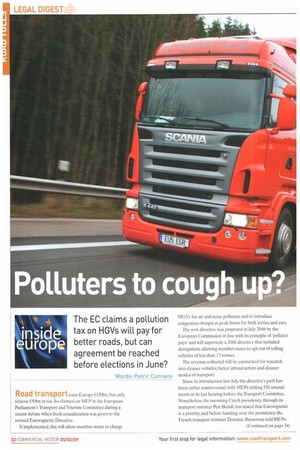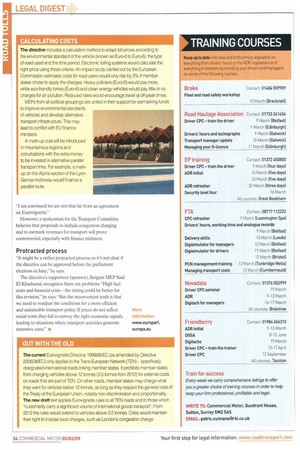The EC claims a pollution tax on HGVs will, pay
Page 32

Page 34

If you've noticed an error in this article please click here to report it so we can fix it.
for better roads, but can agreement be reached before elections in June?
Words: Patric Cunnane HGVs for air and noise pollution and to introduce congestion charges at peak hours for both lorries and cars.
The new directive was proposed in July 2008 by the European Commission in line with its principle of 'polluter pays' and will supersede a 2006 directive that included derogations allowing member states to opt out of tolling vehicles of less than 12 tonnes.
The revenue collected will be earmarked for research into cleaner vehicles; better infrastructure and cleaner modes of transport.
Since its introduction last July, the directive's path has been rather controversial, with MEPs tabling 530 amendments at its last hearing before the Transport Committee. Nonetheless. the incoming Czech presidency, through its transport minister Petr Bend, has stated that Eurovignette is a priority, and before handing over the presidency. the French transport minister Dominic Bussereau told MEPs: "I am convinced we are not that far from an agreement on Eurovignette."
However, a spokesman for the Transport Committee believes that proposals to include congestion charging and to earmark revenues for transport will prove controversial, especially with finance ministers.
Protracted process "It might be a rather protracted process, so it's not clear if the directive can be approved before the parliament elections in June," he says.
The directive's rapporteur (sponsor), Belgian MEP Said El Ithadraoui, recognises there are problems."High fuel costs and financial crisis the timing could be better for this revision," he says. "But the inconvenient truth is that we need to readjust the conditions for a more efficient
and sustainable transport policy. If prices do not reflect More social costs, they fail to convey the right economic signals, informatror leading to situations where transport activities generate www.eu ropa rt.
excessive costs." europa.eu
















































































































































